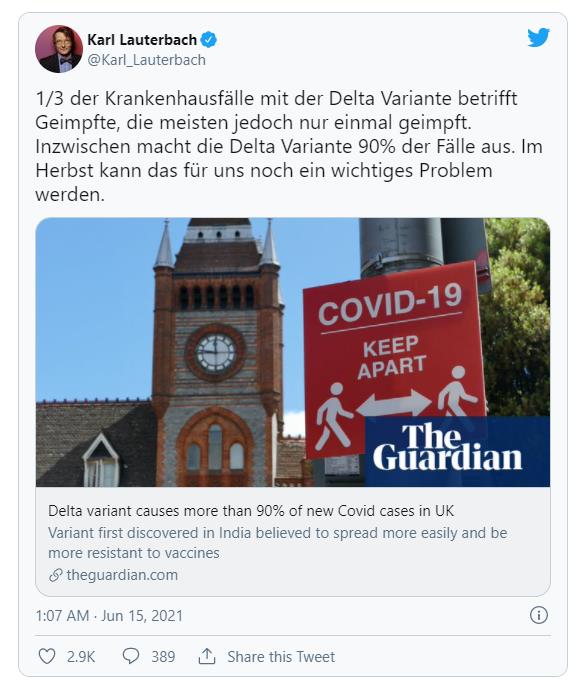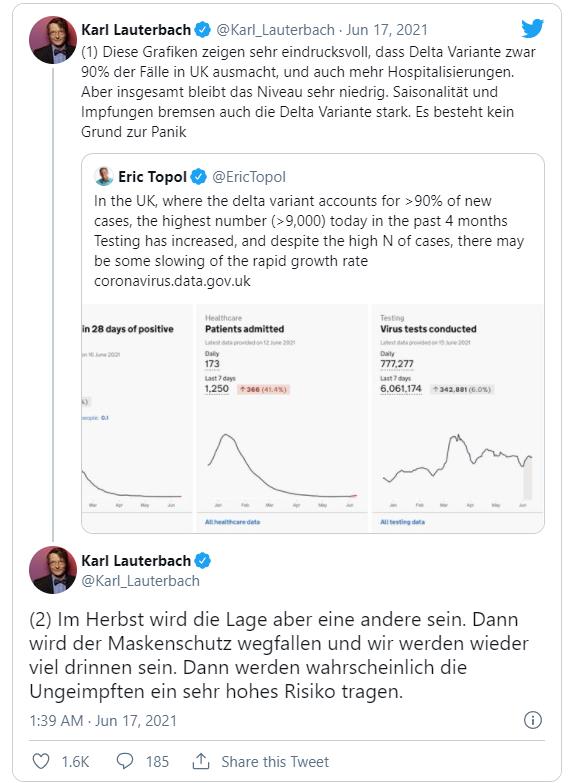
 i_need_contribute
i_need_contribute
Even as vaccination rates pick up, in many countries, including Germany, virologists warn of not enough shots in enough arms to stop variants from spreading and new ones from evolving, including variants that might be able to evade vaccines.
German public health officials are looking warily at data coming out of the United Kingdom. Though nearly 60% of the adult population is fully vaccinated there, the rate of confirmed new cases has been rising since the middle of May, as has the rate of hospitalizations (although not deaths).
The culprit appears to be the delta variant, which was first identified in India. Initial research suggests that it is the most infectious of several variants of concern, which health officials define as strains that have mutated in a way that may make the virus more transmissible.
Karl Lauterbach, an epidemiologist who sits in the German parliament as a Social Democrat MP, recently noted on Twitter that one-third of UK patients hospitalized with the delta variant have had at least one shot. Almost half of the 42 people who died in early June after contracting the delta variant had received a dose, as well.

That is no reason to panic, he said, given the overall low case numbers. However, "come fall it will be a different story. Mask rules will be gone and we'll be inside much more. Unvaccinated people [such as children] will be at a very high risk."

The delta variant was identified in 6% of cases in Germany in early June, according to the Robert Koch Institute for public health (RKI). That is a far cry from the 90% it constitutes in the UK, but it is spreading fast. By the time people in Germany take off their sunglasses and reach for their sweaters again, epidemiologists here predict that delta will be the dominant variant.
In several German states, there have been reports of children testing positive with the delta variant, putting authorities on high alert and prepared to implement partial school closures again.
The undisputed key to stopping its spread and ending the pandemic once and for all is vaccination. Data so far suggest that full vaccination still provides strong protection against delta, albeit slightly lower than other variants like the prevalent alpha variant — which was originally identified in Britain, and is also referred to as B.1.1.7 — as well as the original wild-type coronavirus.
The bigger worry is for people between shots. Efficacy appears to drop from over 50% four weeks after one shot for the Pfizer and AstraZeneca vaccines to about 36% and 30%, respectively. Fewer than 30% of German adults in Germany have received both doses, according to the Health Ministry, although thew total is going up by more than 800,000 people every day. Herd immunity in Germany is still a long way away.
Summer 2021 is shaping up to look a lot like summer 2020, when rules and restrictions went away just in time for people to go out and travel abroad. The virus has shown itself to be a weak opponent to the great outdoors, and, with infections, hospitalizations and deaths all low and getting lower, health officials see little reason to stop the public from enjoying themselves — within reason.
"Should we be outside, enjoying meeting people at restaurants? Yes, absolutely. Should we travel? Absolutely," Tobias Kurth, the director of the Institute of Public Health at Berlin's Charite, told DW. He recommends reasonable precautions such as testing, masking indoors and avoiding crowded spaces. "Enjoy life right now, [but] be respectful," he said.
The risk of a spike in cases remains, Kurth said, as Germany saw starting last fall when a second and third wave claimed far more lives than the first. Even if cases do go up, however, it does not mean that serious illness, hospitalizations and deaths will, too. That is largely thanks to vaccination, and why Kurth wants to base any post-summer response on more than the incidence rate alone. That data point speaks only to infections, which can result in no or only mild symptoms — not how serious the situation is for society at large.
Germany's wintertime struggle with the pandemic was because of the sluggish political response, Kurth said, not the summertime frivolity that preceded it. Reimplementing restrictions, if they become necessary, will be "difficult," but there is no reason to live in fear when the current situation does not call for it.
"You cannot go out with an umbrella because it will rain in three days," Kurth said. "You hold an umbrella if it's raining."